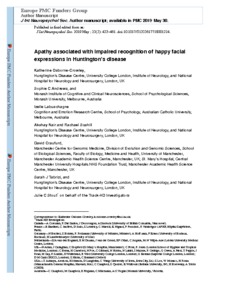Osborne-Crowley, K; Andrews, SC; Labuschagne, I; Nair, A; Scahill, R; Craufurd, D; Tabrizi, SJ; Stout, JC; TRACK-HD Investigators
(2019)
Apathy Associated With Impaired Recognition of Happy Facial Expressions in Huntington's Disease.
J Int Neuropsychol Soc, 25 (5).
pp. 453-461.
ISSN 1469-7661
https://doi.org/10.1017/S1355617718001224
SGUL Authors: Lahiri, Nayana
![[img]](https://openaccess.sgul.ac.uk/113222/1.hassmallThumbnailVersion/emss-80828.pdf)  Preview |
|
PDF
Accepted Version
Available under License ["licenses_description_publisher" not defined].
Download (330kB)
| Preview
|
Abstract
OBJECTIVES: Previous research has demonstrated an association between emotion recognition and apathy in several neurological conditions involving fronto-striatal pathology, including Parkinson's disease and brain injury. In line with these findings, we aimed to determine whether apathetic participants with early Huntington's disease (HD) were more impaired on an emotion recognition task compared to non-apathetic participants and healthy controls. METHODS: We included 43 participants from the TRACK-HD study who reported apathy on the Problem Behaviours Assessment - short version (PBA-S), 67 participants who reported no apathy, and 107 controls matched for age, sex, and level of education. During their baseline TRACK-HD visit, participants completed a battery of cognitive and psychological tests including an emotion recognition task, the Hospital Depression and Anxiety Scale (HADS) and were assessed on the PBA-S. RESULTS: Compared to the non-apathetic group and the control group, the apathetic group were impaired on the recognition of happy facial expressions, after controlling for depression symptomology on the HADS and general disease progression (Unified Huntington's Disease Rating Scale total motor score). This was despite no difference between the apathetic and non-apathetic group on overall cognitive functioning assessed by a cognitive composite score. CONCLUSIONS: Impairment of the recognition of happy expressions may be part of the clinical picture of apathy in HD. While shared reliance on frontostriatal pathways may broadly explain associations between emotion recognition and apathy found across several patient groups, further work is needed to determine what relationships exist between recognition of specific emotions, distinct subtypes of apathy and underlying neuropathology. (JINS, 2019, 25, 453-461).
| Item Type: |
Article
|
| Additional Information: |
This article has been published in a revised form in Journal of the International Neuropsychological Society [https://doi.org/10.1017/S1355617718001224]. This version is free to view and download for private research and study only. Not for re-distribution or re-use. © The International Neuropsychological Society 2019 |
| Keywords: |
Apathy, Cognition, Cognition disorders, Emotion, Huntington’s disease, Social behavior, Adult, Apathy, Emotions, Facial Expression, Facial Recognition, Female, Humans, Huntington Disease, Male, Middle Aged, Social Perception, TRACK-HD Investigators, Huntington's disease, Emotion, Apathy, Social behavior, Cognition, Cognition disorders, Apathy, Cognition, Cognition disorders, Emotion, Huntington’s disease, Social behavior, Adult, Apathy, Emotions, Facial Expression, Facial Recognition, Female, Humans, Huntington Disease, Male, Middle Aged, Social Perception, Experimental Psychology, 11 Medical and Health Sciences, 17 Psychology and Cognitive Sciences |
| SGUL Research Institute / Research Centre: |
Academic Structure > Institute of Medical & Biomedical Education (IMBE) |
| Journal or Publication Title: |
J Int Neuropsychol Soc |
| ISSN: |
1469-7661 |
| Language: |
eng |
| Dates: |
| Date | Event |
|---|
| May 2019 | Published | | 15 February 2019 | Published Online | | 4 December 2018 | Accepted |
|
| Publisher License: |
Publisher's own licence |
| Projects: |
|
| PubMed ID: |
30767839 |
| Web of Science ID: |
WOS:000475686000001 |
 |
Go to PubMed abstract |
| URI: |
https://openaccess.sgul.ac.uk/id/eprint/113222 |
| Publisher's version: |
https://doi.org/10.1017/S1355617718001224 |
Statistics
Item downloaded times since 06 May 2021.
Actions (login required)
 |
Edit Item |



